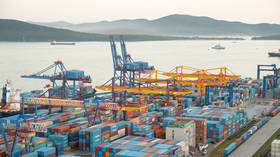New Delhi is interested in boosting long-term supplies of Russian coal and liquefied natural gas (LNG), Moscow’s ambassador to India, Denis Alipov, has said.
Speaking at the Oil and Gas Annual Conference in New Delhi on Wednesday, Alipov outlined existing cooperation in the area of sustainable energy between the two countries, and highlighted the potential to ramp up supplies.
“There’s mutual interest in increasing coking coal and LNG shipments, and we are interested in long-term arrangements that would ensure stability, predictability and affordability of supplies,” the diplomat stated.
He said Russia had become the largest oil supplier to India, accounting for up to 40% of the Asian country’s overall crude imports. Russia’s oil deliveries to India doubled last year to $45 billion, according to the envoy. Exports of mineral fuels to New Delhi jumped by 7% between January and September this year, Alipov said, adding that Indian demand for fuel is expected to increase from the current 5.5 million barrels per day to 6.5 million bpd in 2025.
India, the world’s fifth-largest economy and third-largest importer and consumer of oil, ramped up crude purchases after Russia rerouted supplies to Asia in response to Western sanctions over the Ukraine conflict.
The diplomat also said there was mutual interest in expanding “targeted” investments, which currently exceed $30 billion.
According to Alipov, the figure reflects “our huge experience and expertise in the development of joint projects in India in oil processing, petrochemicals, butyl-rubber production.”
Last month, Indian Foreign Minister S. Jaishankar and Russian First Deputy Prime Minister Denis Manturov emphasized the need to diversify the structure of bilateral trade, which lacks balance at the moment. Last year, India’s exports to Russia stood at less than $5 billion, according to Indian government data.
Bilateral trade between India and Russia has grown significantly over the past two years and currently stands at $66 billion. Moscow and New Delhi have set a target of reaching $100 billion in bilateral trade by 2030.
You can share this story on social media:




